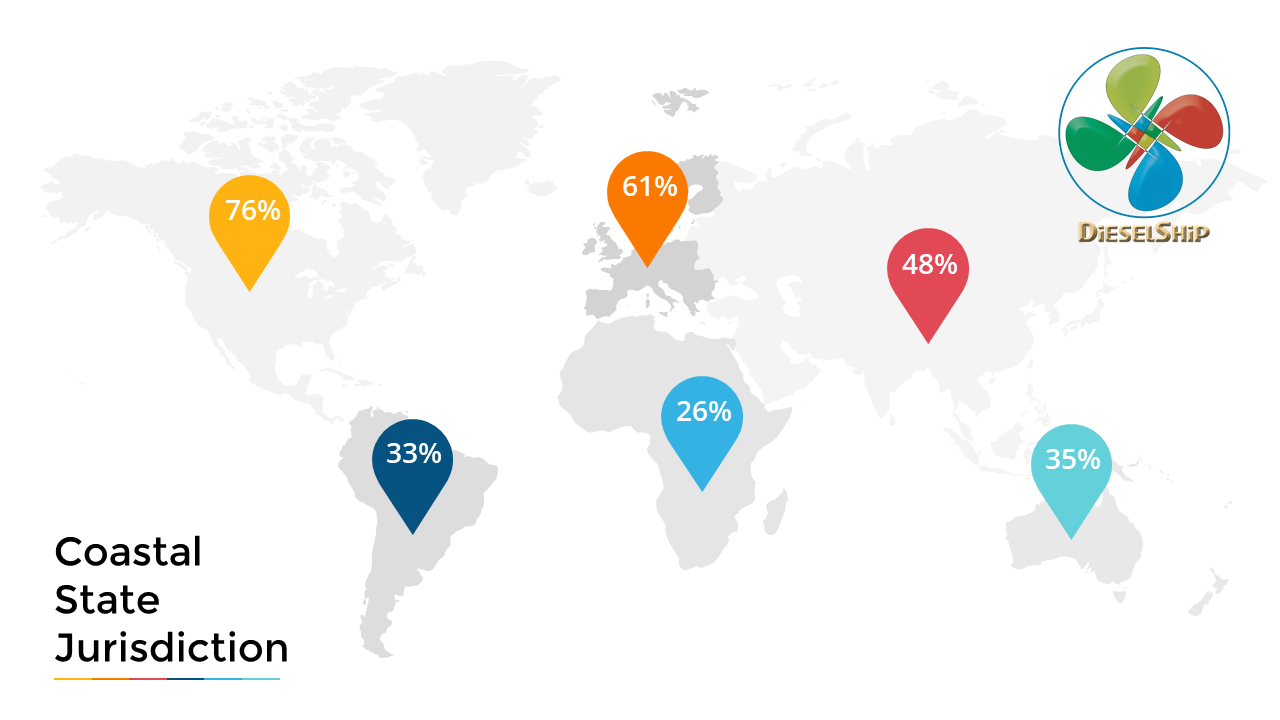Coastal State Jurisdiction

Coastal State Jurisdiction
- Coastal State Jurisdiction – UNCLOS stipulates the measures a coastal state can take and coastal state jurisdiction to ensure peace and good order in their territorial sea. Such a provision provides the coastal state with the necessary latitude to take measures to investigate or prevent such occurrences that would be dangerous or detrimental to the coastal state.
- UNCLOS is careful to prevent creeping coastal state jurisdiction over violations which have occurred prior to the ship entering the territorial sea from a foreign port, granted it is in transit and not entering the coastal state’s internal waters or ports.
Article 56 of UNCLOS offers coastal states jurisdiction in their EEZ, with regard to:
-
Artificial islands, installations and structures;
-
Marine scientific research; and
-
Protection and preservation of the marine environment
- In order for a coastal state to enforce further control beyond the territorial sea, into the Exclusive Economic Zone (EEZ), they must contact the subject vessel’s flag state to fulfil flag state obligations, or develop and exercise port state jurisdiction. Eventually, the ship will have to call at a port.
- National legislation criminalizing certain actions such as environmental damage, carriage of firearms, drugs, or other controlled substances, or even non-compliant labour practices and substandard ship conditions, or agreements with other port states upholding related legislation, can then provide port state jurisdiction to enforce compliance as described below.
concurrent jurisdiction
- There is no prohibition of concurrent jurisdiction under UNCLOS, and vessels therefore can be subject to the jurisdiction of states besides the flag state in certain circumstances, such as entering their maritime zones and ports.
Any exception to this?
- Of course, yes! Government-owned non-commercial vessels and warships are immune to any other jurisdiction except the Flag State’s as stipulated by Article 32 of UNCLOS, and are under no circumstances subject to the jurisdiction of other states.
- The prescriptive power of coastal states can be seen as a way to control the condition of ships navigating lawfully through their territorial seas. UNCLOS lays down rules for enforcement powers by coastal states toward vessels in their maritime zones, specifically in their territorial seas, in Articles 27 and 28.
Article 27
Coastal State Jurisdiction – Criminal jurisdiction on board a foreign ship
- The criminal jurisdiction of the coastal State should not be exercised on board a foreign ship passing through the territorial sea to arrest any person or to conduct any investigation in connection with any crime committed on board the ship during its passage, save only in the following cases:
(a) if the consequences of the crime extend to the coastal State;
(b) if the crime is of a kind to disturb the peace of the country or the good order of the territorial sea;
(c) if the assistance of the local authorities has been requested by the master of the ship or by a diplomatic agent or consular officer of the flag State; or
(d) if such measures are necessary for the suppression of illicit traffic in narcotic drugs or psychotropic substances.
- The above provisions do not affect the right of the coastal State to take any steps authorized by its laws for the purpose of an arrest or investigation on board a foreign ship passing through the territorial sea after leaving internal waters.
- In the cases provided for in paragraphs 1 and 2, the coastal State shall, if the master so requests, notify a diplomatic agent or consular officer of the flag State before taking any steps, and shall facilitate contact between such agent or officer and the ship’s crew. In cases of emergency this notification may be communicated while the measures are being taken.
- In considering whether or in what manner an arrest should be made, the local authorities shall have due regard to the interests of navigation.
- Except as provided in Part XII or with respect to violations of laws and regulations adopted in accordance with Part V, the coastal State may not take any steps on board a foreign ship passing through the territorial sea to arrest any person or to conduct any investigation in connection with any crime committed before the ship entered the territorial sea, if the ship, proceeding from a foreign port, is only passing through the territorial sea without entering internal waters.
Article 28
Civil jurisdiction in relation to foreign ships
- The coastal State should not stop or divert a foreign ship passing through the territorial sea for the purpose of exercising civil jurisdiction in relation to a person on board the ship.
- The coastal State may not levy execution against or arrest the ship for the purpose of any civil proceedings, save only in respect of obligations or liabilities assumed or incurred by the ship itself in the course or for the purpose of its voyage through the waters of the coastal State.
- Paragraph 2 is without prejudice to the right of the coastal State, in accordance with its laws, to levy execution against or to arrest, for the purpose of any civil proceedings, a foreign ship lying in the territorial sea, or passing through the territorial sea after leaving internal waters.


